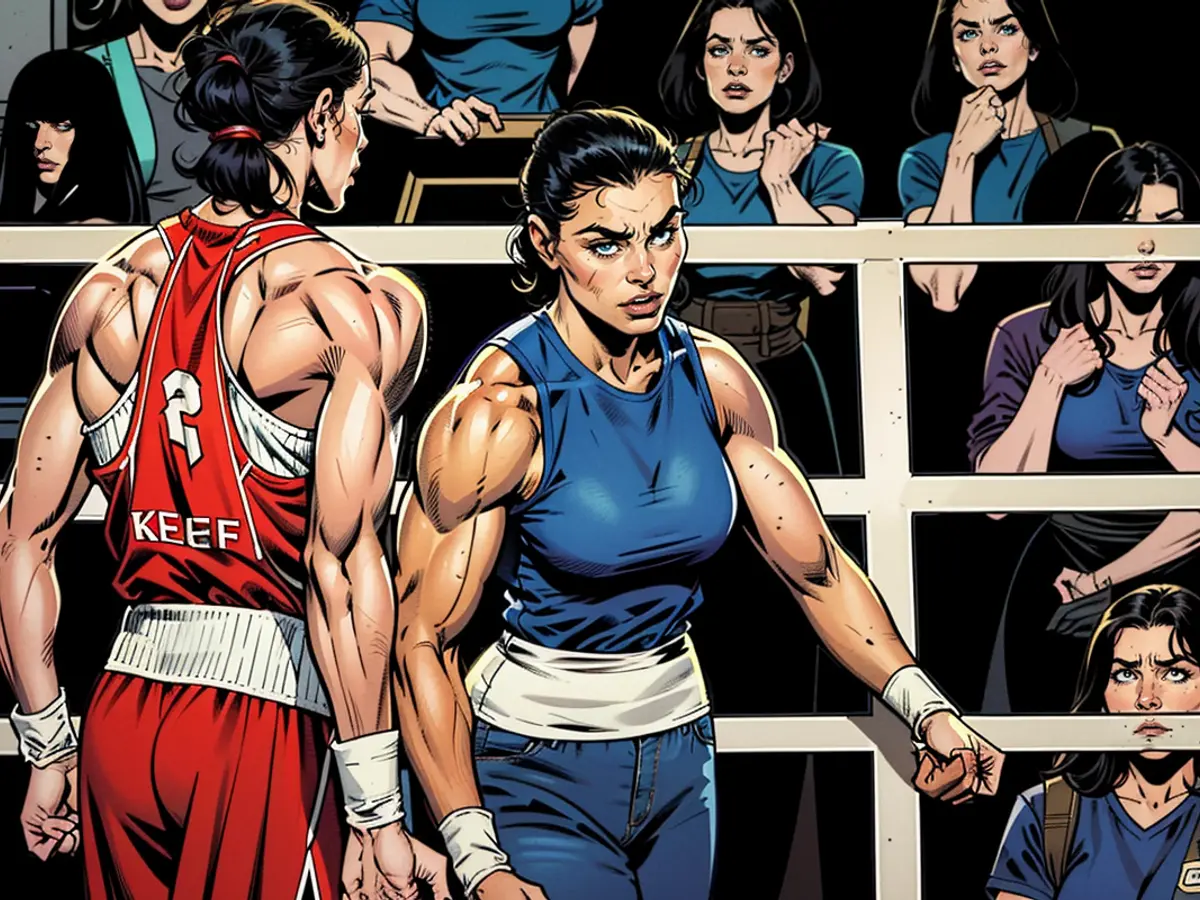Boxing Khelif and the Flood of Misinformation
The boxing match lasted just 46 seconds, then Imane Khelif advanced to the second round at the Olympics. But the excitement was huge, the gender of the Algerian was called into question. Many untruths were circulating - even Regina Halmich was involved.
Imane Khelif was only known to absolute boxing insiders before these Olympics. The 25-year-old Algerian suddenly found herself in the spotlight in Paris. Unwillingly, because some people questioned her and Taiwan's Lin Yuting's femininity.
Even former boxer Regina Halmich is among those who are upset despite the facts. "What I think about a biological man boxing against a woman at the Olympics? I could explain it in detail. But I don't feel like it. I'll keep it short and simple: Stop this nonsense!" she ranted in an Instagram video.
Italy's Prime Minister Giorgia Meloni of the right-wing party Fratelli d'Italia weighed in: "You have to be able to fight on equal terms. From my point of view, it was not a fair competition," said the 47-year-old. "I think athletes with male genetic characteristics should not be allowed to compete in women's competitions. Not to discriminate against anyone, but to protect the rights of female athletes to compete on equal terms." Even Harry Potter author J.K. Rowling, who has vehemently insisted on two genders in recent years and denies the existence of trans and inter people, commented. The tone: maximum scandal! Here a man is beating up women.
IOC: "They are women"
The doubts were raised by the boxing federation IBA, which was suspended by the International Olympic Committee due to corruption and is not allowed to participate in the Olympics. The IBA had excluded the two athletes from the World Championships last year. Lin was even disqualified after winning her bronze medal. At times, this was justified by elevated levels of the male sexual hormone testosterone. According to the IBA, the athletes were not subjected to a testosterone test, but to "a separate and recognized test, the details of which remain confidential". The verdict: "This test clearly showed that neither athlete met the criteria for participation in the competition and that they had an advantage over other female participants."
IBA President Umar Kremlev, who is also suspended along with his federation, then said about the results of the unnamed test: "The athletes have XY chromosomes." Whether Khelif might have a rare genetic disposition and, in addition to an X chromosome, also has a Y chromosome, is unknown. According to studies, about 6.4 out of 100,000 women have XY chromosomes. This does not automatically make them a man. Women with XY chromosomes have given birth to children.
For these Olympics, the IOC has granted them the right to start and has clearly stated: "They are women". The IOC criticized "misleading information" about the two athletes. "Both were victims of a sudden and arbitrary decision by the IBA." This was made "according to the protocols available on the IBA website, solely by the IBA Secretary General". The IOC holds the IBA responsible for the "current aggression".
Swimmer Lia Thomas, athlete Caster Semenya
Before the 2023 World Championships, there were no notable issues with Khelif and Yuting. Khelif had been competing in women's amateur boxing world championships since 2018. Notably, she never stood out for any perceived superiority, placing 17th in 2018, 33rd in 2019, and winning silver in 2022 by reaching the final. She finished fifth at the 2021 Tokyo Games.

However, these positions have opened up discussions about what remains unknown in the realm of gender and sports. The binary system of male and female categorization in high-level sports has its limitations, regardless of the direction, it can quickly become discriminatory. Out of the 32 sports, only one does not fit into this binary: equestrian. In disciplines like eventing, dressage, and show jumping, there is only one competition for all genders.
Khelif is not the first athlete whose gender assignment has been debated. Laurel Hubbard, a weightlifter with male sex characteristics at birth, competed in the women's category at the Tokyo Olympics. The Court of Arbitration for Sport (CAS) ruled that transgender swimmer Lia Thomas could not participate in international competitions. In athletics, Caster Semenya, the 800m Olympic champion from Rio 2016 with "Differences of Sex Development," was subjected to degrading gender tests and is now only allowed to compete in women's categories if she artificially lowers her testosterone levels with medication, leading her to retire from her career.
However, unlike Semenya, Khelif's testosterone levels have not been proven to be higher. In fact, her qualification for the Olympics confirms that her testosterone levels are currently and have been below the required 10 nmol/L for at least the past 12 months. Claims that she is "biologically" a man, as Halmich alleged, are false. She is not trans, was born a girl, and has not undergone any transition - which is also banned in Algeria. Khelif's father reportedly forbade her from doing sports as a child, deeming boxing inappropriate for girls.
The Algerian Olympic Committee condemned the criticism against Khelif, stating, "These defamatory attempts based on lies are completely unfair, especially at this crucial moment when she is preparing for the Olympics, the peak of her career... We are all behind you, Imane. The whole nation is behind you and proud of your achievements."
Controversy escalated as Khelif advanced to the second round in the 66kg class, defeating her Italian opponent Angela Carini, who retired after just 46 seconds and two hard hits, crying. Carini's coach, Emanuele Renzini, initially reacted, "I don't want to judge for the IOC, and I know the topic is difficult, but this fight was unfair." Carini herself also fueled the debate by not shaking hands after the fight.
The next day, the Italian expressed her bewilderment over the debate. "If the IOC allows her to compete, I respect that decision," said the 25-year-old to "La Gazzetta dello Sport". She had tried to ignore the discussion. "These controversies have certainly made me sad, and I feel sorry for the opponent who is also here just to compete," said Carini.
The missed handshake was a misunderstanding. "It wasn't an intentional gesture, I apologize to her and to everyone. I was angry because the Olympics were over for me. I have nothing against Khelif, if I met her again, I would hug her," said Carini.
Her statement that it wasn't fair wasn't directed at Khelif. "That's absolutely not the case. It wasn't fair that my dream ended so quickly," said Carini. She had prepared for three years and wanted to compete for a medal. Khelif's second hit felt like a shock to her: "I gave up, something wasn't right. It wasn't planned, it was an instinctive decision."
Remarkably calm amidst the turmoil was Khelif's upcoming opponent: "I'm not afraid. If they're a man, my victory will only be greater," said the Hungarian Anna Luca Hamori, who will face Khelif in the quarterfinals on Saturday.

Imane Khelif's participation in the Olympic Games 2024 in Paris has sparked considerable debate. Despite her success in previous amateur boxing world championships and placings, her gender was called into question by some, leading to controversy and criticism.
The International Olympic Committee (IOC) has firmly stood by Khelif, stating that she is a woman and has the right to compete in women's categories. They criticized the misleading information spread about Khelif and held the boxing federation IBA responsible for the agitation.








